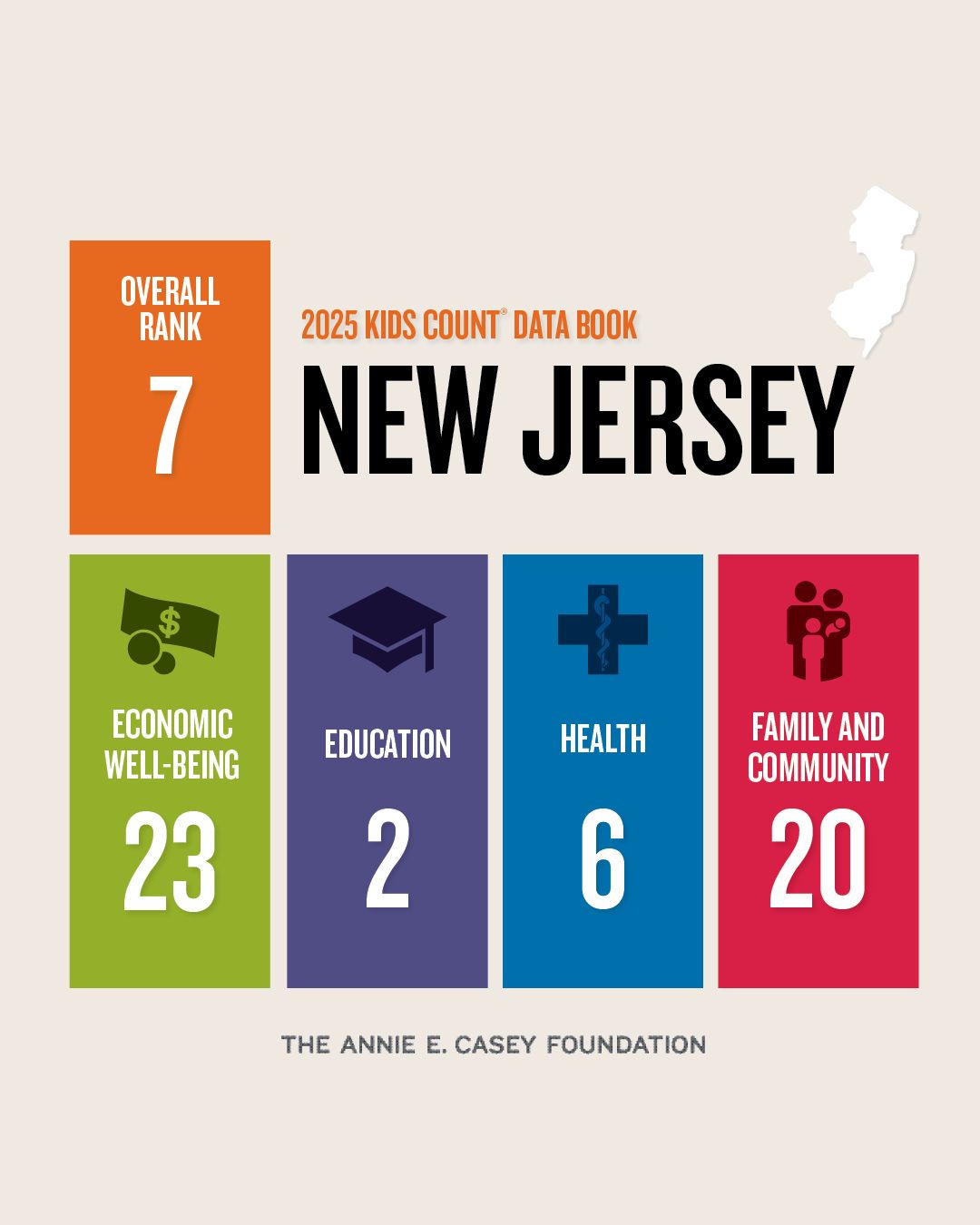Posted on June 9, 2025
NJ Ranks 7th in 2025 KIDS COUNT Data Book as Advocates for Children of NJ Urges Focus on Supporting Thriving Kids and Families
Data shows that NJ leads nation in education but economic instability persists & housing costs burden one-third of families, affecting child well-being, the Annie E. Casey Foundation finds
NEWARK, N.J. — New Jersey ranks seventh in child well-being, according to the 2025 KIDS COUNT Data Book, a 50-state report of recent data developed by the Annie E. Casey Foundation analyzing how kids are faring in post-pandemic America. Although the state leads the nation in eighth grade math proficiency and boasts the highest school enrollment rates for 3- and 4-year-olds, the state's graduation outcomes tell a different story. With 15% of students not graduating on time, New Jersey ranks 31st nationally in graduation rates — a concerning gap that underscores the need for state leaders to strengthen educational equity and ensure all students have access to quality learning opportunities from early childhood through high school.
Each year, the Data Book presents national and state data from 16 indicators in four domains—economic well-being, education, health, and family and community factors—and ranks the states according to how children are faring overall.
New Jersey ranks second nationally in fourth grade reading proficiency, trailing only Massachusetts. Still, 62% are not reading at grade level by fourth grade, when they are expected to have already transitioned from learning to read to reading to learn in third grade.
Key indicators reveal a number of setbacks across multiple measures of economic stability since 2019.
- Child poverty has increased, with New Jersey dropping from 8th to 14th nationally—an 8% increase in 2023 since 2019. Poverty is considered income below $30,900 for a family of 2 adults and 2 children in 2023.
- Employment instability affects nearly half a million children. Currently, 475,000 New Jersey children (24%) live in families where no parent maintains full-time, year-round employment. The state's ranking slipped from 10th to 17th place—a 9% increase between 2019 and 2023
- The high cost of housing burdens one-third of families. Roughly 665,000, or 33%, of New Jersey's children live in households spending more than 30% of their income on housing. Although the state's national ranking improved slightly from 45th to 42nd place, the underlying affordability crisis persists.
"The data tells a clear story: when families struggle, children's educational outcomes suffer," says Mary Coogan, president and CEO of ACNJ, New Jersey's member of the Casey Foundation's KIDS COUNT network. "We can't address educational challenges in isolation from housing affordability, employment stability, and poverty. Our state leaders have an opportunity to tackle these interconnected issues with coordinated policies that support both immediate family needs and long-term success for New Jersey's children."
Other key findings:
- In 2023, 23,000, or 5%, of teenagers ages 16 to 19 were not in school and not working, a 17% decrease since 2019.
- The teen birth rate fell by 20% between 2019 and 2023.
- The share of children living in high-poverty areas dropped by 13% between 2014–18 and 2019–23. However, in 2019–23, 7%, or 136,000, children were still living in high-poverty areas.
- In 2023, only 4% of children were without health insurance—a figure that has remained the same since 2019.
- In 2022-2023, 28% of youth, ages 10 to 17 were overweight or obese, ranking 11th-best nationally.
“We know what kids need to grow up healthy and connected so they can thrive as adults: Stable homes, strong schools, nutritious food, meaningful relationships and opportunities to learn, play and grow. Programs that meet these needs are smart investments, fostering long-term gains like employment and economic growth,” says Coogan.
In its 36th year of publication, the KIDS COUNT® Data Book provides reliable statewide numbers to help leaders see where progress is being made, where greater support is needed and which strategies are making a difference. Advocates for Children of New Jersey encourages lawmakers and officials in New Jersey to use this detailed information to unite across party lines and respond with initiatives that invest in young people. By offering a local road map, the Data Book equips policymakers, advocates and communities with the information they need to make decisions that help kids and young people thrive.
“With the state budget deadline of June 30 approaching, now is the time for community members and advocates to urge lawmakers to prioritize investments in children and families," Coogan says. "These budget decisions will have a ripple effect on our economy, our education and our future. Together, we can ensure that New Jersey's children aren't just part of the conversation — they're at the very center of our lawmakers' priorities," she says.
###
RELEASE INFORMATION
The 2025 KIDS COUNT Data Book will be available at www.aecf.org/databook.Journalists interested in creating maps, graphs and rankings in stories about the Data Book can use the KIDS COUNT Data Center at datacenter.aecf.org.
ABOUT THE ANNIE E. CASEY FOUNDATION
The Annie E. Casey Foundation creates a brighter future for the nation’s young people by developing solutions to strengthen families, build paths to economic opportunity and transform struggling communities into safer and healthier places to live, work and grow. For more information, visit www.aecf.org. KIDS COUNT is a registered trademark of the Annie E. Casey Foundation.


